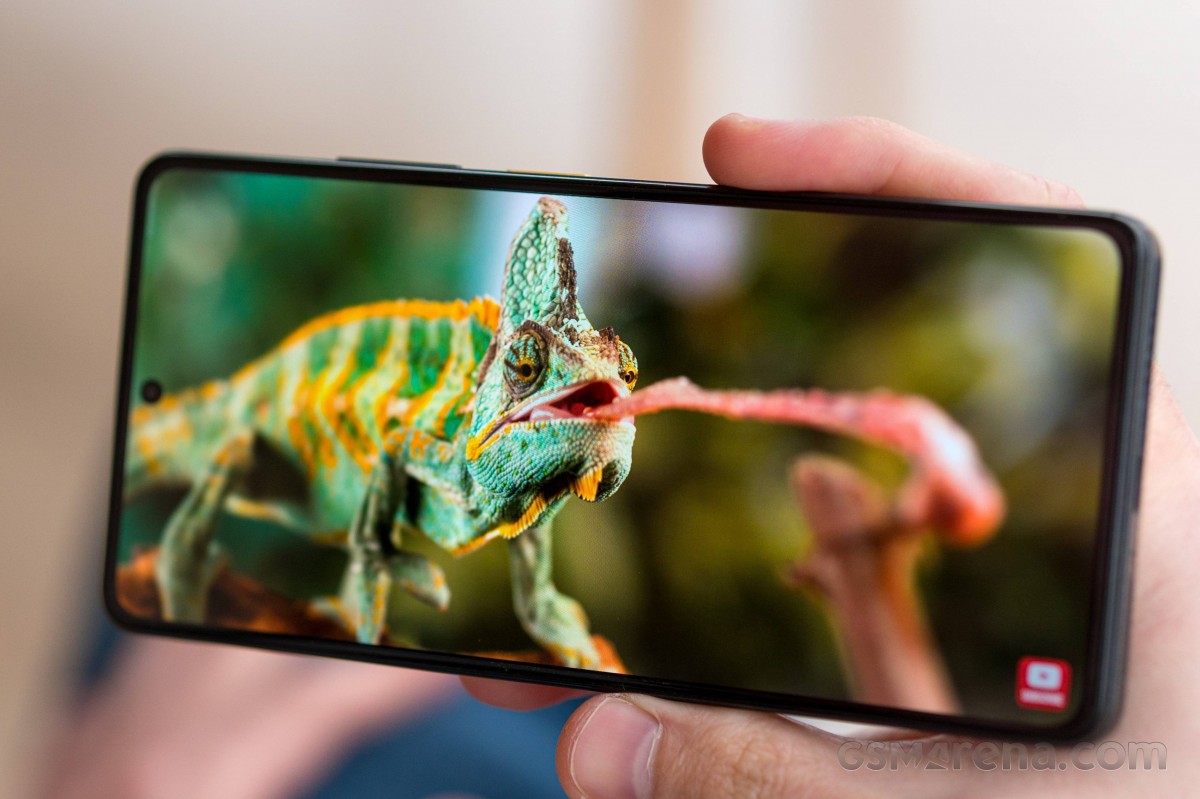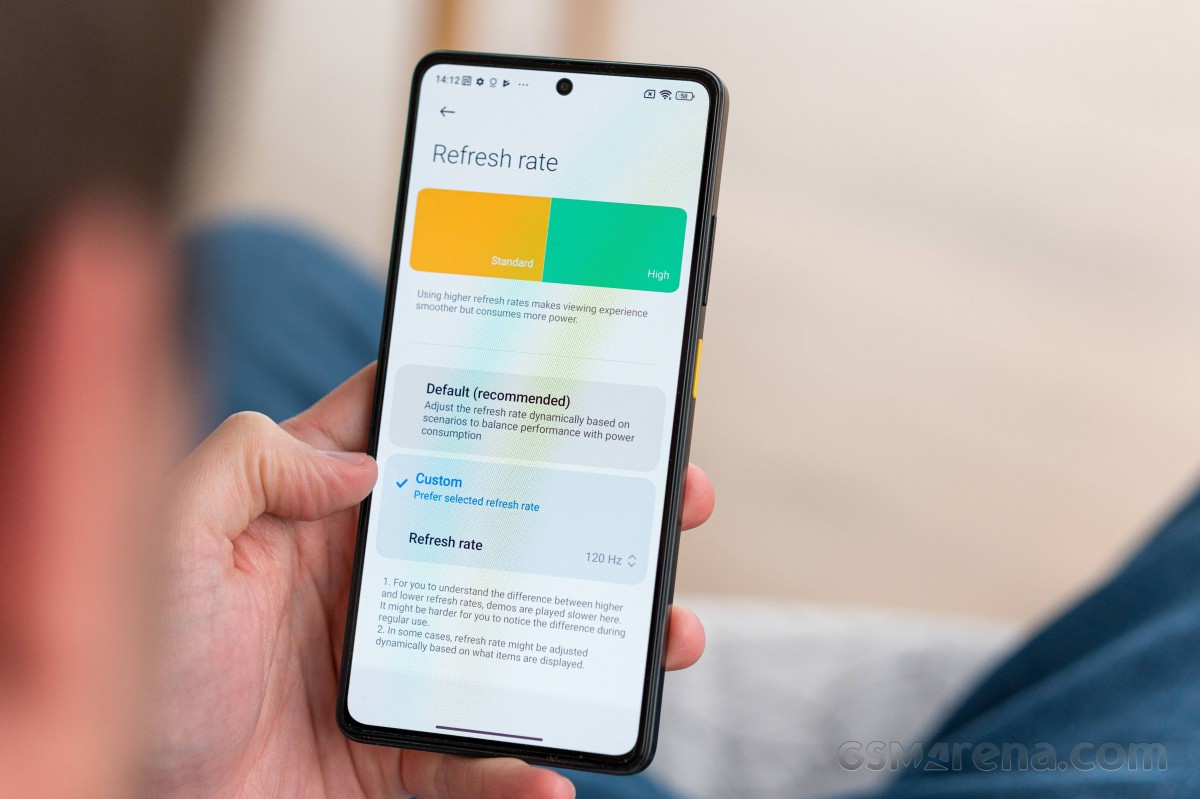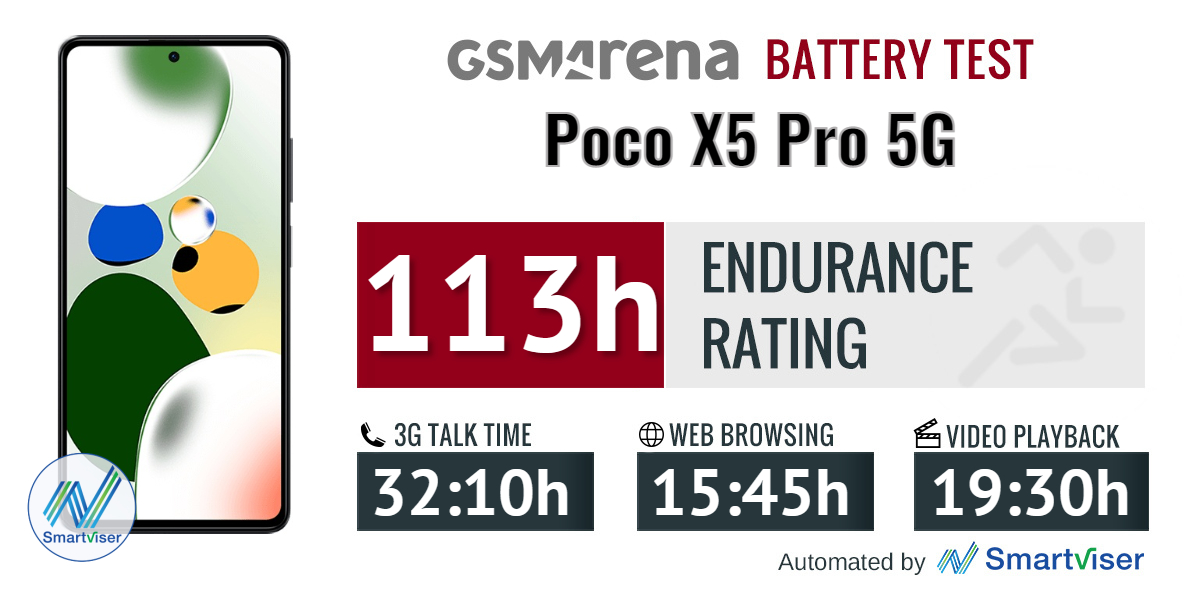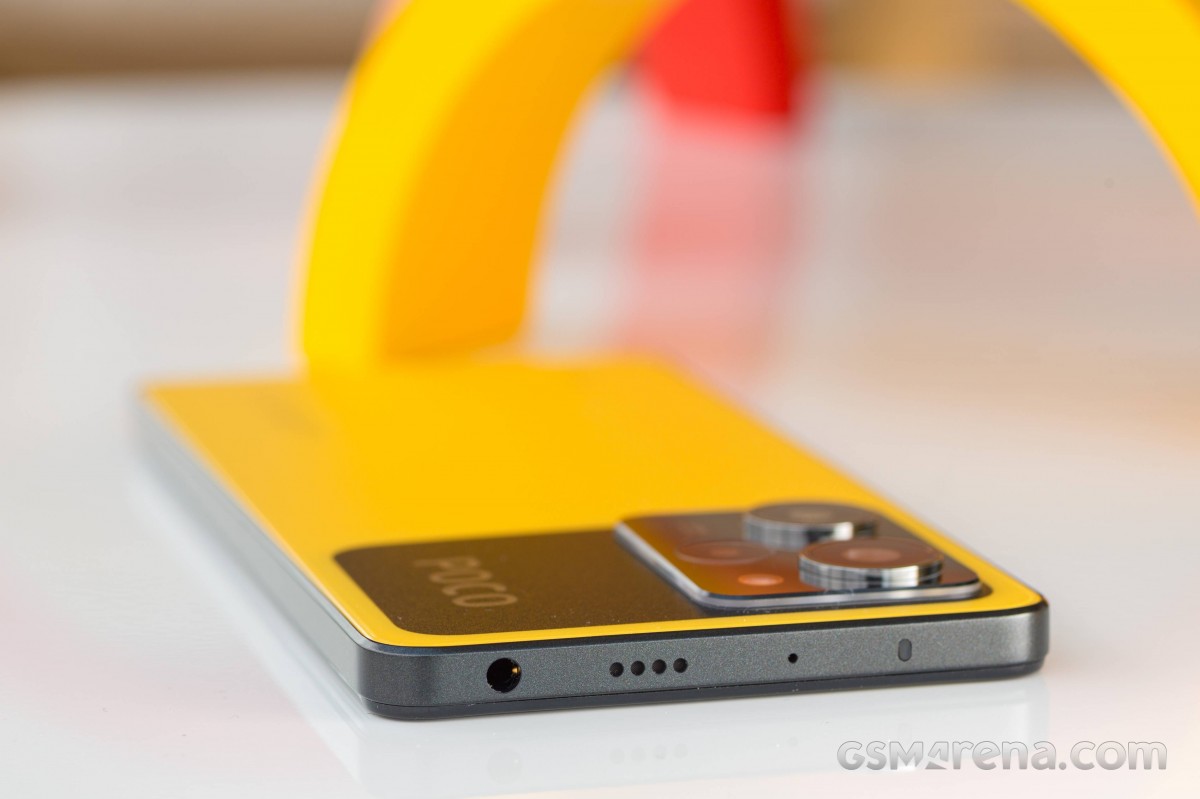Poco X5 Pro review

Display
The Poco X5 Pro features the updated 6.67-inch AMOLED screen from the Poco X4 Pro and the Redmi Note 11 phones. The improved panel supports 10-bit color depth and can display over 1B colors. And in addition to HDR10, it now supports Dolby Vision content.
The rest of the specs are rather familiar - 1,080 x 2,400 pixels resolution or 395ppi, 120Hz refresh rate, 240Hz touch response, wide color support, and Gorilla Glass 5 protection.

The display supports 1920Hz PWM dimming to minimize eye strain in low-light conditions.
Poco is promising 500nits of typical and 900nits of maximum brightness, and we are happy to confirm those numbers with our display test. The minimum brightness at point white was 2nits, a great one.
| Display test | 100% brightness | ||
| Black, |
White, |
||
| 0 | 491 | ∞ | |
| 0 | 912 | ∞ | |
| 0 | 456 | ∞ | |
| 0 | 728 | ∞ | |
| 0 | 477 | ∞ | |
| 0 | 754 | ∞ | |
| 0.395 | 470 | 1190:1 | |
| 0.496 | 600 | 1210:1 | |
| 0.327 | 458 | 1401:1 | |
| 0.4 | 534 | 1335:1 | |
| 0 | 479 | ∞ | |
| 0 | 760 | ∞ | |
| 0 | 427 | ∞ | |
| 0 | 830 | ∞ | |
| 0 | 496 | ∞ | |
| 0 | 690 | ∞ | |
| 0 | 484 | ∞ | |
| 0 | 809 | ∞ | |
| 0.47 | 590 | 1255:1 | |
| 0.53 | 619 | 1168:1 | |
| 0 | 449 | ∞ | |
| 0 | 636 | ∞ | |
| 0 | 466 | ∞ | |
| 0 | 663 | ∞ | |
Color accuracy
The Poco X5 Pro display supports DCI-P3 wide color space, and it's the default setting. The display color options offer three different color models - Vivid (default, DCI-P3), Saturated (DCI-P3 with saturation boost), and Standard (sRGB). You can fine-tune the color temperature for each mode. There is also a custom mode, where you can select the color gamut and fine tune colors, saturation, hue, contrast, gamma.
The Vivid (default) option reproduces DCI-P3 faithfully, and we found it to be fairly accurate, excluding the slightly bluish-white and gray hues (fixable by selecting Warm Color temperature). The Standard option corresponds to sRGB and offers accurate rendering, including the white and gray colors.
Refresh rate
The display supports up to 120Hz refresh rate, and there are two refresh modes - Custom (choose between 120Hz or 60Hz), and Default (automatic switching behavior).

The screen supports four fixed refresh rates per its specifications - 30Hz, 60Hz, 90Hz, and 120Hz.
Both Custom 120Hz and Default (auto) do the same - the system uses 120Hz for the phone's UI and most apps (games included), at least while the user is interacting with the display or there is motion on screen. Then, once it sees a static image for a couple of seconds, it drops the refresh rate down to 60Hz to save power. 60Hz is always used for the camera app, video playback and streaming.
The only occasion we saw the screen use 30Hz was for the Always-on Display and the Notification Light.
The display also supports 90Hz, but we did not find any app to trigger this refresh rate (this doesn't mean it is not supported).
Streaming
The Poco X5 Pro comes with Widevine L1 DRM support, and Full HD streaming with HDR10 and Dolby Vision support is available across popular platforms, Netflix included.
Battery life
The Poco X5 Pro is powered by a 5,000mAh battery and runs on the Snapdragon 778G 5G chipset, one that has quickly become a favorite for the mid-range class. We've met a few smartphones running on it, such as the Xiaomi 11 Lite 5G NE and the Samsung Galaxy A52s, and the Poco X5 Pro battery life turned out to be in line with those devices.
The Poco X5 Pro scored a 113h endurance rating, and it aced our call, web browsing, and video playback tests. The standby performance was slightly above average.

Our battery tests were automated thanks to SmartViser, using its viSerDevice app. The endurance rating denotes how long the battery charge will last you if you use the device for an hour of telephony, web browsing, and video playback daily. More details can be found here.
And let's see how this Poco X5 Pro stacks up against the competition.
Video test carried out in 60Hz refresh rate mode. Web browsing test is done at the display's highest refresh rate whenever possible. Refer to the respective reviews for specifics. To adjust the endurance rating formula to match your own usage patterns, check out our all-time battery test results chart, where you can also find all phones we've tested.
Charging speed
The 5,000mAh battery inside the Poco X5 Pro supports up to 67W fast wired charging and the phone ships with a 67W power adapter.

We've captured 47% charge in just 15 minutes - that's plenty fast for the class and close to what competitors with similar battery and charging achieve. Then we got an 82% charge at the 30min mark.
A full charge is achieved in 50 minutes.
There is no optimized night charging in settings, unfortunately.
Speakers
The Poco X5 Pro has stereo speakers on its top and bottom, and they support the Dolby Atmos enhancement.

The top speaker has two outlets - one top and one front-facing - and sound is coming from both. Muting either of them will reduce the audio quality, but not the loudness.
We've listened to music and watched videos with and without the Dolby Atmos enhancement (on by default), and we strongly recommend keeping the Dolby sound ON. It increases the loudness and makes for a much richer output with better voice and more bass.
The Poco X5 Pro scored a Very Good mark on our loudness test, and we can confirm it indeed sounds nicely loud. The sound quality can be described as very good as well - the vocals are good, there is some bass presence, and the high range is quite fine.
Use the Playback controls to listen to the phone sample recordings (best use headphones). We measure the average loudness of the speakers in LUFS. A lower absolute value means a louder sound. A look at the frequency response chart will tell you how far off the ideal "0db" flat line is the reproduction of the bass, treble, and mid frequencies. You can add more phones to compare how they differ. The scores and ratings are not comparable with our older loudspeaker test. Learn more about how we test here.
Reader comments
- srinivas
- 10 Feb 2025
- XZV
audio low
- Fishbone
- 15 Jan 2025
- nH{
Just shoot with regular photo mode
- Anonymous
- 23 Dec 2024
- Cb8
'And speaking of detail, if you really need flagship-grade one, you can achieve it by resizing the 108MP photos down to 12MP. The images are a bit noisy, but much more detailed.' How to do this?



